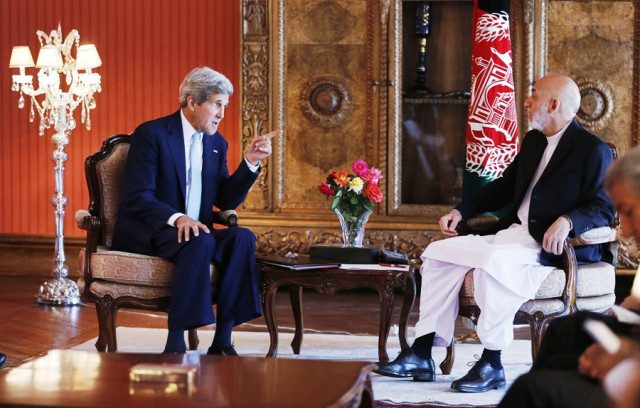Kerry in Kabul on key mission to calm election turmoil
Kerry to meet poll rivals, Abdullah and Ghani, who are locked in a bitter row over who won run-off election.

Kerry in Kabul on key mission to calm election turmoil
"Obviously we are at a very critical moment for Afghanistan," Kerry said as he met the head of the UN assistance mission Jan Kubis in the heavily fortified US embassy in Kabul.
"The election legitimacy hangs in the balance. The future potential of the transition hangs in the balance, so we have a lot of work to do."
Kerry flew in on a hastily arranged mission, landing in the Afghan capital in the dead of night.
Later Friday he will meet poll rivals Abdullah Abdullah and Ashraf Ghani, who are locked in a bitter row over who won last month's run-off election to choose a successor to President Hamid Karzai.
The stakes could not be higher, as the next president will have to steer the war-torn country as international troops withdraw, leaving Afghan forces to fight a bloody, stubbornly resilient Taliban insurgency.
"Our hopes are that there is a road that can be found that will provide that capacity for the questions to be answered, for people's doubts to be satisfied and hopefully for a future to be defined," Kerry said.
But he warned that was not "an automatic at this point".
Kubis vowed the UN would do its utmost to help Afghanistan "finalise and complete the political transition... in a way that will strengthen the stability and unity of the country."
Preliminary results have put Ghani in the lead, but Abdullah, who has already once lost a presidential bid in controversial circumstances, has declared himself the true winner, saying massive fraud robbed him of victory.
The election stand-off has sparked fears that protests could spiral into ethnic violence - and even lead to a return of the fighting between warlords that ravaged Afghanistan during the 1992-1996 civil war.
Kerry was also to meet outgoing president Karzai, who has held the reins of power for 13 years.
"A perfect election in these conditions is neither possible nor really the objective," a senior US administration admitted.
The US was "going to push for the very best, most credible, most transparent and most broadly accepted outcome that we can under the circumstances," he said.
Ghani's campaign spokesman Abdul Ali Mohammadi said Kerry was "coming here to solve the election deadlock, and I think it is a positive step".
Abdullah's spokeswoman Lailuma Ahmadi also welcomed Kerry's visit, saying: "We welcome any move and efforts to separate clean votes from unclean votes or fraudulent votes".
Kerry will be pressing both candidates to accept a thorough audit, the US official said.
Auditors may look at districts with a very high turnout, or a perfectly round number of recorded votes, or where the number of women voters outnumbered men, "which in the Afghan context seems like an unlikely outcome".
Amid protests and political turmoil, the United States has warned both candidates that any attempted power grab will lead to an immediate cut in billions of dollars of annual aid.
After more than 13 years of war following the 2001 US invasion to oust the hardline Taliban regime, President Barack Obama has said all American forces will be withdrawn by the end of 2016.
The 30,000 US troops on the ground will be whittled down to 9,800 next year.
Eight million votes were cast in the run-off, and preliminary results showed Ghani took an estimated 56 percent, while Abdullah, the front-runner in the first round, got some 43 percent - a gap of around one million votes.
UN officials have said a full audit of the results could take up to two weeks, but some Afghan officials are pressing to stick by an election calendar that would see the new president inaugurated on August 2.
"We don't consider that an impossible goal," the US official said, but getting a credible outcome "was more important that sticking to a timeline".
The Obama administration is also desperately waiting for Afghan leaders to sign a bilateral pact governing the presence of US forces in the country beyond this year.
Karzai walked away from the deal, but both presidential candidates have said that they would sign it.



















COMMENTS
Comments are moderated and generally will be posted if they are on-topic and not abusive.
For more information, please see our Comments FAQ